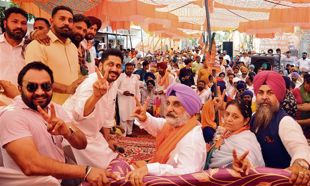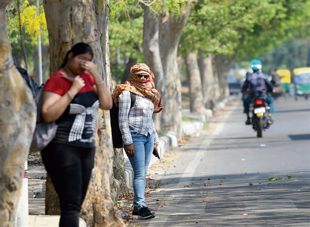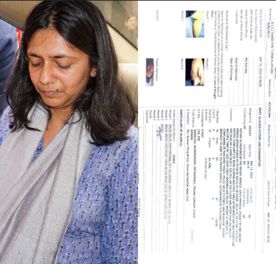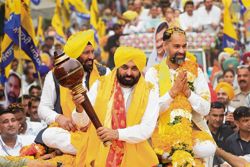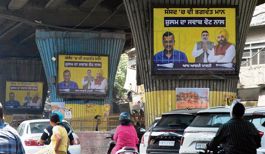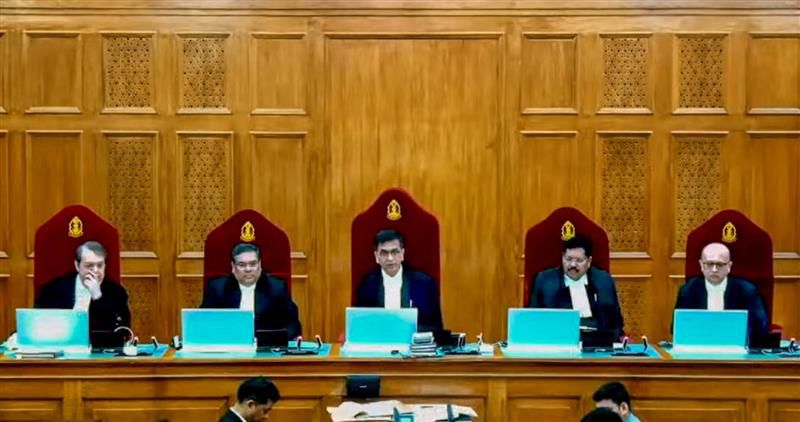
A five-judge bench headed by Chief Justice of India Dr D.Y. Chandrachud and comprising Justices Sanjiv Khanna, B.R. Gavai, J.B. Pardiwala and Manoj Mishra during pronouncement of verdict on the Electoral Bond Scheme, in New Delhi on February 15, 2024. PTI
Satya Prakash
New Delhi, February 15
Ahead of the 2024 Lok Sabha election, the Supreme Court on Thursday declared unconstitutional the electoral bonds scheme that allowed individuals and companies to make unlimited anonymous donations to political parties.
Noting that voters have right to know, a five-judge Constitution Bench led by CJI DY Chandrachud said the Electoral Bonds Scheme violated Article 19(1)(a) of the Constitution which guaranteed right to freedom of speech and expression and included right to information within its ambit.
“We are of the opinion that the information about funding to a political party is essential for a voter to exercise their freedom to vote in an effective manner. The Electoral Bond Scheme and the impugned provisions to the extent that they infringe upon the right to information of the voter by anonymizing contributions through electoral bonds are violative of Article 19(1)(a) (right to freedom of speech and expression,” the Bench said.
The Beach -- which also included Justices Sanjiv Khanna, BR Gavai, JB Pardiwala and Manoj Misra -- said the disclosure of information regarding electoral bonds was necessary to identify corruption and quid pro quo transactions in governance. “Such information is also necessary for exercising an informed vote,” it added.
Maintaining that “the integrity of the electoral process is a necessary concomitant to the maintenance of the democratic form of government,” the Bench said, “While quid pro quo and clientelistic corruption erodes quality and integrity of government decision making, the power of money may also pose threat to the electoral process itself.”
The top court ordered the State Bank of India to stop issuing Electoral Bonds immediately and submit all details by March 6 to the Election Commission which shall make all donations public by March 13. All Electoral Bonds within the 15-day validity period shall be returned by political parties to the purchasers, it added.
“Based on the analysis of the data currently available to us, along with our previous observation asserting that voters' right to know supersedes anonymity in political party funding, I arrive at the conclusion that the Scheme fails to meet the balancing prong of the proportionality test,” the CJI said.
Justice Khanna delivered a separate but concurring judgment.
Welcoming the verdict, petitioner Association for Democratic Reforms’ counsel Prashant Bhushan said, "This is a salutary judgment which will enhance our democratic process."
The Constitution Bench also declared unconstitutional amendments made to the Representation of the People Act, 1951, the Income-tax Act, 1961, and the Companies Act, 2013 through the Finance Act, 2017 to facilitate introduction of the Electoral Bonds Scheme.
Earlier, political parties had to declare all contributions more than Rs 20,000 with no exceptions, and maintain a record of all donations exceeding Rs 20,000 for tax purposes. In a financial year, companies could contribute a maximum of 7.5% of their average net profits from the preceding three years. The amendments did away the restrictions to allow political parties to receive funds through Electoral Bonds.
It said, “The amendment to Section 182 (Companies Act) is manifestly arbitrary for (a) treating political contributions by companies and individuals alike; (b) permitting the unregulated influence of companies in the governance and political process violating the principle of free and fair elections; and (c) treating contributions made by profit-making and loss-making companies to political parties alike.”
Introduced through the Finance Act, 2017, an Electoral Bond is a bearer instrument like a Promissory Note which can be purchased by an Indian citizen or an Indian company whose identity would remain secret from everybody except the SBI from whom it has to be purchased. Once purchased, the buyer can give it to a political party, which could encash it using its bank account.
It was introduced through the Finance Act, 2017, which made amendments to several statutes, including the RBI Act, Representation of People Act, Income Tax Act and Companies Act to facilitate the scheme which was notified on January 2, 2018.
In its PIL filed in 2017, ‘Association for Democratic Reforms’ (ADR) alleged corruption and subversion of democracy through illicit and foreign funding of political parties and lack of transparency in their accounts. Besides ADR, CPI(M) and Common Cause have also challenged electoral bonds scheme.
Maintaining that several constitutional issues having a tremendous bearing on the sanctity of electoral process were involved in the petitions challenging the validity of Electoral Bonds Scheme, the petitioners had earlier urged the Supreme Court to refer the matter to a Constitution Bench.
The Centre maintained that the electoral bonds scheme was an “absolutely transparent” mode of political funding and it was impossible to get any black or unaccounted money through it.
Chronology of events
Following is the chronology of events in the case related to Electoral Bonds Scheme:
• 2017: The Electoral Bond Scheme was introduced in the Finance Act, 2017
• Sept 14, 2017: Association for Democratic Reforms (ADR) moves SC against the scheme
• Oct 3, 2017: SC issues notices to Centre, EC on ADR’s PIL
• Jan 2, 2018: Centre notifies Electoral Bond Scheme
• March 26, 2021: SC refuses to stay sale of electoral bonds ahead of assembly elections in West Bengal, Assam, Kerala, Tamil Nadu and Puducherry
• Nov 7, 2022: Electoral Bond Scheme amended to increase the sale days from 70 to 85 in a year where any assembly election may be scheduled
• Oct 16, 2023: A Bench led by CJI DY Chandrachud refers petitions against Electoral Bond Scheme to a five-judge Constitution Bench
• Oct 31, 2023: A five-judge Constitution Bench led by CJI DY Chandrachud begins hearing on petitions against Electoral Bond Scheme
• Nov 2, 2023: Constitution Bench reserves verdict on PILs challenging Electoral Bond Scheme
• Feb 15, 2024: SC declares Electoral Bond Scheme unconstitutional; says it violates right to freedom of speech and expression and voters’ right to know
Join Whatsapp Channel of The Tribune for latest updates.






















